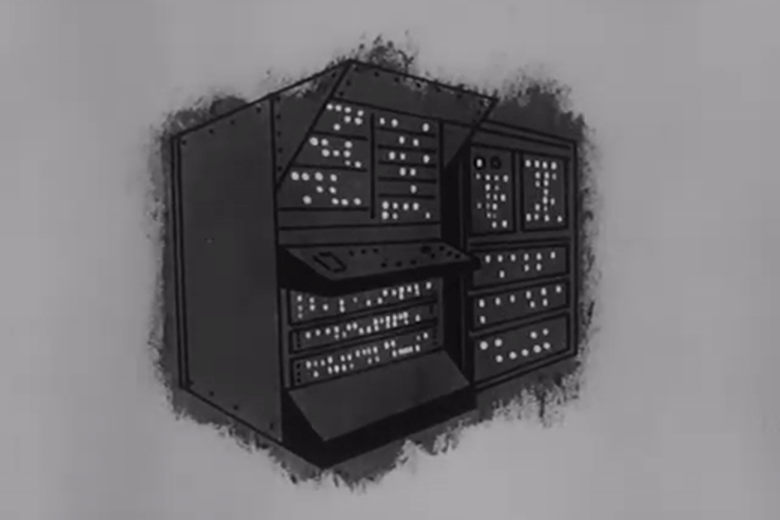It’s weird to think that an abacus would have still been used sixty years ago, or so posits the documentary series The Computer and the Mind of Man. This six part series originally aired on San Francisco local television station KQED in 1962, a time where few people outside of academia had even stood next to such a device.
Episode 3 titled “The Universal Machine” was dedicated to teaching the public how a computer can enhance every type of business provided humans can sufficiently describe it in coded logic. Though mainly filtered through IBM’s perspective as the company was responsible for funding the set of films; learning how experts of the time contextualized the computer’s potential was illuminating.
The real meat of the episode was the interview with Dr. Charles Decarlo, who was the director of education at IBM at the time. He explained how a major obstacle to the progression of the medium was the development of programming languages like Fortran and Algol. How these programming languages are structured was a key point of emphasis as to distinguish them from spoken languages, because the order in which the words appear matters more to a machine than the context of those words. As much as we might like for our computers (and other humans) to understand sarcasm…it only complicates communication on the other end.
Everything in the documentary sounds appropriately science-fictiony. Lots of boops and bleeps paired with discordant strings are punctuated by that prototypical narrator voice over where everything is pointedly enunciated. Thanks goes to [William] for uploading the series to YouTube and for reminding us how great the acronym GIGO is. In other words, “Garbage in, garbage out.”
“The computer, the universal machine; in that it is capable of doing whatever we are capable of instructing it to do.”
– Narrator, The Computer and The Mind of Man (1962)
Also just in case you missed it, there’s another great Retrotechtacular post on crash testing trucks with a soundtrack that is everything you would hope it would be.
















I’d like to point out that the “boops and bleeps” are by the electronic music pioneer Morton Subotnick, and looks like that this series was among his very first works, if not the first.
Brings to mind the old saying that anything termed AI simply becomes another part of normal computing or software once it is completed successfully (chess algos and bot pathfinding in games comes to mind).
The term AGI is loaded with so much mythic baggage that it will probably never be used to refer to a machine even if it arguably meets the definition (doubts about such a thing ever happening aside, I’m saying that if it did, people would still not apply the label).
The “Universal Machine” is a term that actually seems to describe what it is we want of AI. Yet once again I suspect that if one was made, it would collapse into mundane software afterwards, as the mythos of it would have worn off by then.
“Everything in the documentary sounds appropriately science-fictiony. [..]”
Hm. I think the documentary sounds quite modest and down to earth.
Especially the voices are very calm and the wording is non-sensational.
The term “universal machine” makes sense, too, since the machine isn’t hard-wired to a specific task.
It’s programmable in software already, no plugs must be changed on the backside of a cabinet anymore.
A common language of the days might have been ALGOL-60, a forerunner to Pascal.
‘Universal machine’ does make a lot of sense. Think how we use them in our hobbies. You don’t buy a specific machine to run a robot, or turn on the lights, or you name it. You can ‘program’ the same ‘machine’ (say a RPI Pico) to do what your task is at hand. ‘Universal Machine’ is very much the correct term for a computer.
And of course we still use the term today : Garbage in, Garbage out. Still up to man to 1) have good input, and 2) write a correct program, to get good information out. And this is a ‘very’ important concept to know as a lot of the information is false, skewed, built on false premises (or maybe just assumptions) and fed into a computer and then the results are used as fact which can affect a lot of people.
+1